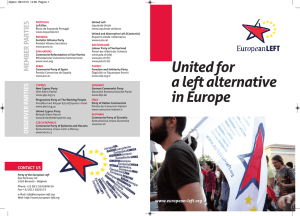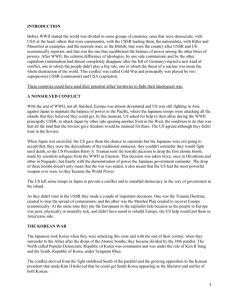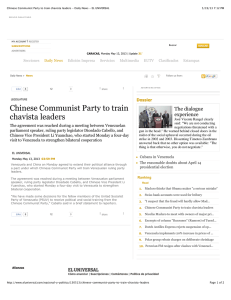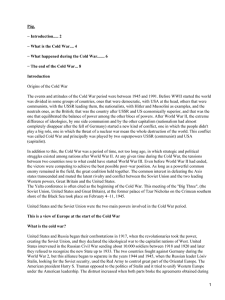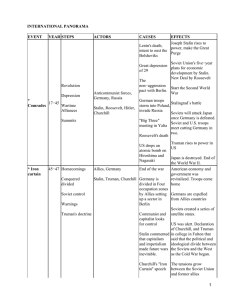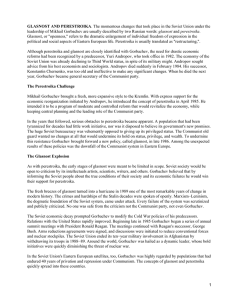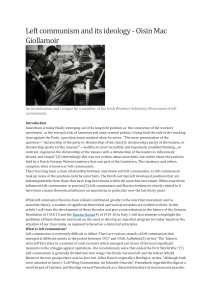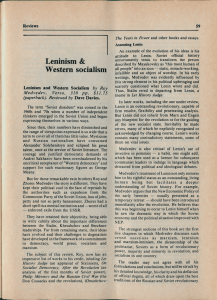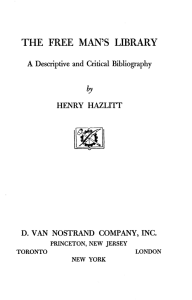Chapter 28 Peace and Cold War, 1945–1973 People Antonio
Anuncio
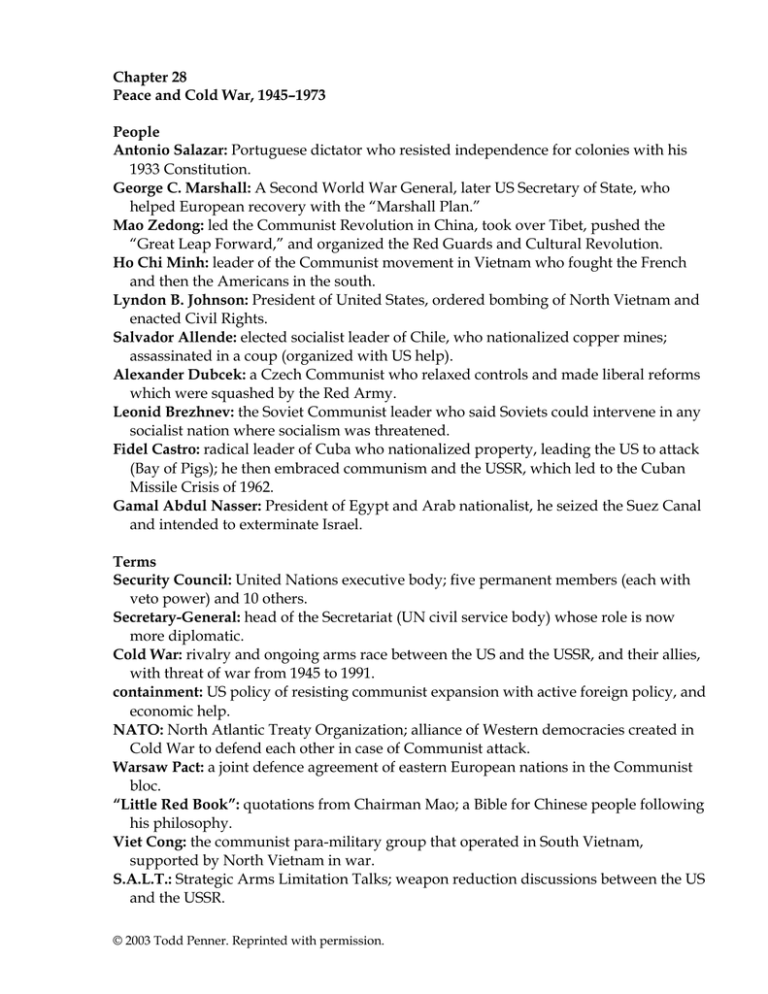
Chapter 28 Peace and Cold War, 1945–1973 People Antonio Salazar: Portuguese dictator who resisted independence for colonies with his 1933 Constitution. George C. Marshall: A Second World War General, later US Secretary of State, who helped European recovery with the “Marshall Plan.” Mao Zedong: led the Communist Revolution in China, took over Tibet, pushed the “Great Leap Forward,” and organized the Red Guards and Cultural Revolution. Ho Chi Minh: leader of the Communist movement in Vietnam who fought the French and then the Americans in the south. Lyndon B. Johnson: President of United States, ordered bombing of North Vietnam and enacted Civil Rights. Salvador Allende: elected socialist leader of Chile, who nationalized copper mines; assassinated in a coup (organized with US help). Alexander Dubcek: a Czech Communist who relaxed controls and made liberal reforms which were squashed by the Red Army. Leonid Brezhnev: the Soviet Communist leader who said Soviets could intervene in any socialist nation where socialism was threatened. Fidel Castro: radical leader of Cuba who nationalized property, leading the US to attack (Bay of Pigs); he then embraced communism and the USSR, which led to the Cuban Missile Crisis of 1962. Gamal Abdul Nasser: President of Egypt and Arab nationalist, he seized the Suez Canal and intended to exterminate Israel. Terms Security Council: United Nations executive body; five permanent members (each with veto power) and 10 others. Secretary-General: head of the Secretariat (UN civil service body) whose role is now more diplomatic. Cold War: rivalry and ongoing arms race between the US and the USSR, and their allies, with threat of war from 1945 to 1991. containment: US policy of resisting communist expansion with active foreign policy, and economic help. NATO: North Atlantic Treaty Organization; alliance of Western democracies created in Cold War to defend each other in case of Communist attack. Warsaw Pact: a joint defence agreement of eastern European nations in the Communist bloc. “Little Red Book”: quotations from Chairman Mao; a Bible for Chinese people following his philosophy. Viet Cong: the communist para-military group that operated in South Vietnam, supported by North Vietnam in war. S.A.L.T.: Strategic Arms Limitation Talks; weapon reduction discussions between the US and the USSR. © 2003 Todd Penner. Reprinted with permission. Sputnik: the first artificial satellite, it was launched by the Soviets, giving them a lead in the space race; it scared the US and motivated them to go to the moon. 1. • The General Assembly: all member nations meet yearly and vote on issues of general importance. • The Security Council: five permanent members (with veto) and 10 elected for fiveyear terms to execute UN actions. • The Secretariat: the civil service headed by the Secretary-General, with a major diplomatic function. 2. • the Congo: Belgians had not prepared the Congolese for independence, so their withdrawal was followed by a bloody civil war, and then a brutal dictatorship. • India: the British, faced with a strong independence movement and violence, agreed to withdraw and work out a plan for separate Hindu and Muslim states. • Indonesia: the Dutch tried to resist the independence movement led by General Sukarno but were too weak; he had also suppressed Communist Party. • Algeria: the French fought to hold onto it, but could not win; General de Gaulle granted independence. 3. • He is a black French psychiatrist who became sympathetic to the Algerian independence idea. • He believed Europe’s wealth was based on raw materials taken from colonies (gold, diamonds, oil, silk, etc.) • He was a major influence on post-colonialism and violent resistance to imperial rule. 4. • Occupied Germany and its capital, Berlin, was divided into four zones. • 1948: Soviets blockaded the Western part of Berlin, since it united. Berlin Airlift relieved the people. • 1961: Soviets closed the border to prevent East Germans from leaving and erected a concrete wall. • The Berlin Wall became symbol of communist dictatorship. 5. • • • • • • 1949: Communist Revolution, led by Mao Zedong and others. 1950: Takeover of Tibet. (1959: Dalai Lama flees after revolt.) 1950s: controls were relaxed. 1958: Great Leap Forward, (which was a disaster). 1966: Cultural Revolution, led by the Red Guards. 1976: death of Mao Zedong. © 2003 Todd Penner. Reprinted with permission. 6. • Korea was a divided nation after the First World War. North Koreans invaded the South, with help from USSR. The US and the UN sent troops to defend the South in a “limited war.” It ended in a stalemate. • Vietnam was under Communist control in the North after the First World War, and sought to unite with the South, which was resisted by French and then American troops. In a war of attrition, the US lost heart and withdrew. 7. • Iran in 1951: an elected government that nationalized property was overthrown in coup led by the CIA. • Guatemala in 1954: a US-sponsored invasion forced the elected President into exile and reversed his reforms. • Chile in 1973: A socialist was elected president and then nationalized the copper mines, but was killed in a US-organized coup led by General Augusto Pinochet (who then repressed the people and tortured and executed his opponents). 8. • Poland in 1956: Soviets showed military muscle to keep its empire in line. • Hungary in 1956: after anti-Soviet protests, a liberal and nationalist leader was killed by Soviets and thousands fled. • Czechoslovakia in 1968: when liberal communists came to power, Soviets sent in the tanks and replaced them. 9. • 1959: Fidel Castro overthrew dictator Batista and began to nationalize Americanowned properties. • 1961: CIA-sponsored invasion fails at Bay of Pigs. • 1962: US learns that Soviets are sending nuclear missiles, as well as advisors and conventional weapons to Cuba. – Kennedy blocks shipments to Cuba, but does not invade. – The world watches Cuban Missile Crisis unfold. – Nuclear annihilation avoided when Khrushchev and US remove missiles. 10. • 1948: UN partitioned Palestine and Jews proclaimed the nation of Israel; Arabs attacked but were defeated and many became refugees. • 1956: Egypt nationalized the Suez Canal, and was attacked by Israel, Britain and France. The UN intervened and began peacekeeping. • 1967: Egypt, Syria and Jordan attacked Israel and were defeated in Six-Day War, but still refused to recognize Israel’s existence. • 1973: Arabs attacked Israel by surprise on Yom Kippur but nothing was settled. Oil becomes an Arab weapon for the first time. © 2003 Todd Penner. Reprinted with permission.
